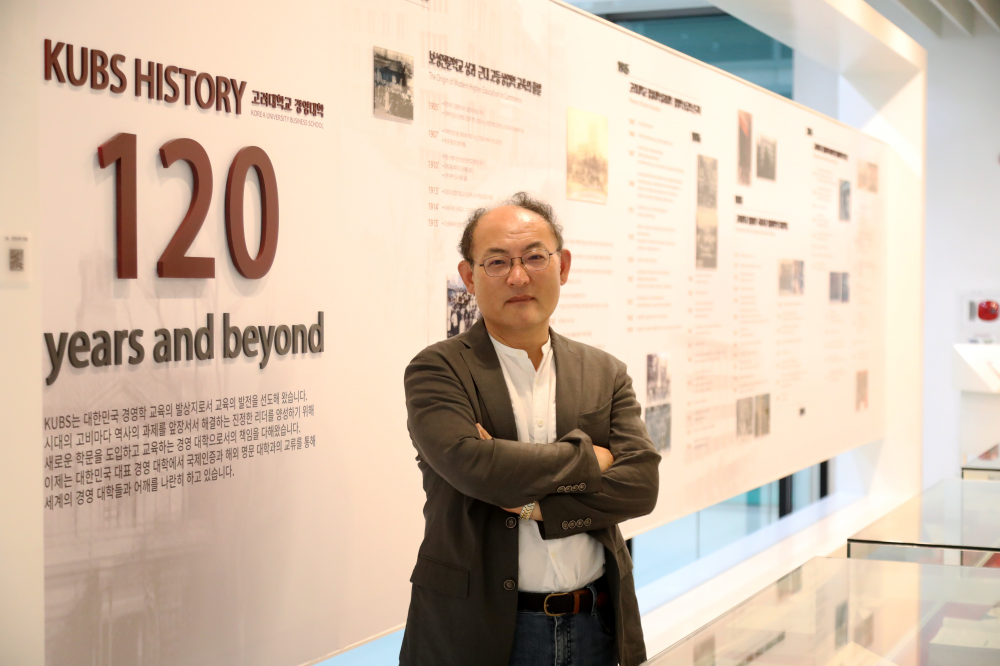뉴스
KUBS 소식
[Interview] A Bridge Between the Past and Future — Interview with Chair Hojung Shin
2025.08.06 Views 23 국제실
[Interview] A Bridge Between the Past and Future
— Chair Hojung Shin Reflects on the Meaning of KUBS’s 120th Anniversary

In 2025, Korea University Business School (KUBS) celebrates its 120th anniversary. At a time when the very concept of “business” was unfamiliar in Korea, KUBS planted the seeds of business education and has since grown into a cornerstone of the field in the country. To mark this milestone, a range of commemorative projects have been launched, including a photo book “120 Years of KUBS in Pictures”, a historical volume “The Path of Business Administration”, and the traditional Hosang Daedongje festival. Beyond mere celebration, this is a moment for the school to reflect on its identity and future vision. At the center of these efforts is Hojung Shin, Chair of the KUBS 120th Anniversary Commemoration Committee. He emphasizes that “rather than grand words or embellishment, we aimed to capture the history and spirit of the community as they are.” We sat down with him to hear more about the thoughtful initiatives that aim to connect the school’s past, present, and future.
Q1. You're leading the 120th anniversary initiatives. How do you feel about this role, and what exactly is your role in the project?
A1. The 120th anniversary project has been made possible through the dedication and collaboration of many individuals. I see myself as someone simply wrapping up what others have already thoughtfully planned. While I was previously serving as the Vice President for Development and External Affairs, I gave my best to the university, and my successor, Professor Jae Uk Chun —who originally chaired the 120th anniversary committee—suggested I take over to finalize the project. So my focus has been on organizing and completing the framework already established by many contributors.
Q2. Following the photo book “120 Years of KUBS in Pictures”, a historical book is set to be released in August. Could you tell us more about it?
A2. This historical book is meaningful not simply because it presents facts, but because it situates them within philosophical and socio-cultural contexts. Interestingly, the term “business administration” (gyeong-yeong-hak) began to be formally used in Korea through Korea University. The original title of the book was “The Path of K-Business Administration”, but we revised it to simply “The Path of Business Administration” to reflect a more neutral, calm tone and honor the pioneering role we’ve played. The book’s design is intentionally understated, so that the narrative of KUBS’s journey unfolds naturally. I believe this is a project with scholarly and cultural significance—not only for KUBS members, but for those observing the broader history of business education in Korea.
Q3. Could you introduce the upcoming Hosang Daedongje festival scheduled for September?
A3. Hosangje is a long-standing traditional festival at KUBS. In earlier days, it began with a formal ceremony in front of the main building, attended by faculty and students alike. While today’s version is more relaxed and festive, the underlying spirit of unity and community remains unchanged. I have fond memories of the festival from my undergraduate days—especially the “Makgeolli Marathon,” where students would run around campus, stopping at various stations to enjoy a cup of makgeolli (traditional rice wine). I’m curious to see how today’s students reinterpret and enjoy Hosangje in their own way.
This year, during the anniversary week, we’ll also host the “Mapping the Future” idea competition on September 26, the day after Hosang Daedongje. This event invites students to envision future business trends and societal changes through the lens of business studies—a timely and meaningful challenge, especially as the discipline reexamines its boundaries and identity. Topics such as population decline, regional extinction, technological disruption, and questions of national identity in Korean society will all be up for discussion.
Q4. Looking back on 120 years of history, what is your vision for the future of KUBS?
A4. The Dean has outlined a clear vision: “Spearheading Next Intelligence.” We are now in an era where business education must go beyond technical know-how to include data literacy, responsiveness to social change, and a thoughtful balance between technology and ethics. Business administration, at its core, is a study of people—it encompasses organizations, leadership, strategy, and social responsibility. From this perspective, KUBS must lead the exploration of future directions, expand its intellectual boundaries, and guide conversations around the identity and value of business education.
Q5. Finally, is there a message you’d like to share with members of KUBS and future generations of students?
A5. I’d like to share a heartfelt message with our younger students. While our society is becoming increasingly individualistic, we must remember that human beings are inherently social. Education, work, and family all take place within a society—and within these social structures, rituals play a vital role. Just like weddings, graduations, or entrance ceremonies, this 120th anniversary is not simply an event, but a moment to reaffirm the values of our community. I hope the younger generation doesn’t overlook the meaning of these rituals. They are not about empty formality, but about anchoring ourselves in a shared identity and sense of belonging. Realizing that KUBS has been a source of joy and meaning in your life—and choosing to acknowledge and take part in that—is what the 120th anniversary is truly about. It’s something we should do not out of obligation, but out of a natural sense of connection. I hope no one forgets that we are all part of this community.


